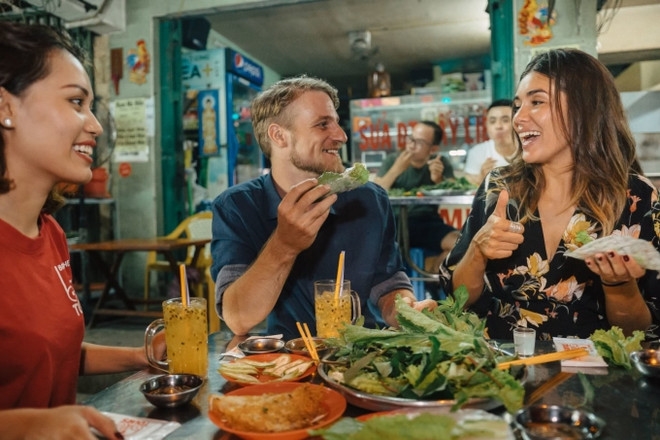Leveraging destinations
According to Vietnam’s tourism system master plan for 2021-2030, with a vision to 2045, one of the key plans is to make use of regional cultural values to develop tourism products linked with heritage, festivals, lifestyle, and cuisine, connect Vietnamese heritage elements with those in the region and the world, and integrate tourism with the cultural industry.
This highlights the significance of leveraging the diverse cultural assets from various regions to create unique and competitive tourism offerings, thereby enhancing Vietnam’s tourism brand and competitiveness in the world.
    |
 |
|
Foreign tourists enjoy Vietnamese food. (Photo: vneconomy.vn) |
In Ho Chi Minh City, Dr. Doan Manh Cuong from the Nguyen Tat Thanh University suggested diversifying culinary tourism products with greater interaction and immersion, such as specialized street food tours at Ben Thanh Market, Tan Dinh Market, or Nguyen Thuong Hien food street. These can be combined with bicycles, motorbikes, or walking to connect with the urban life.
Other possibilities include cooking class tours featuring cultural storytelling, or fusion culinary tours highlighting Chinese food in Cho Lon, Indian cuisine on Le Loi street, and French dishes at local restaurants. The city could also enhance food festivals by integrating tourism, cultural performances, cooking contests, and exhibitions, he suggested.
From the perspective of Tay Ninh, home to the art of vegetarian cuisine, a national intangible cultural heritage, MSc. Du Quoc Dao of the Van Hien University suggested that aside from serving unique vegetarian dishes, the province should enrich tourist experiences by introducing spices, ingredients, health benefits, and aesthetic presentation connected with philosophy and religious rituals. This, he noted, can elevate Tay Ninh’s culinary tourism to a new level.
According to Nguyen Quoc Y of the Netspace Vocational Training JSC, Vietnam’s culinary specialties are abundant across regions. If promoted and developed effectively, they could stimulate the food processing industry while attracting tourists to taste, experience, and purchase specialties as gifts.
He perceived that culinary tourism programs that include cooking not only allow visitors to enjoy dishes but also to cook alongside chefs and artisans, thereby deepening their understanding of local food culture. Many tours could even include farm or field visits where ingredients originate.
Developing skilled human resources
Experts agreed that culinary tourism requires human resources with not only culinary expertise but also management and organizational skills. The success of culinary tourism products depends not just on the food and settings, but heavily on the quality of tour guides. Guides must possess cultural and historical knowledge and a deep understanding of local cuisine. Chefs and restaurants also need training to serve international visitors while meeting global standards of service quality and food safety.
Dr. Doan Manh Cuong emphasized the need for more measures for improving human resources quality, such as offering training on local culinary history and culture for guides, cross-cultural communication skills, and food safety knowledge. Chefs should be equipped with skills in presentation, communication with international visitors and preservation of traditional recipes, and encouraged to take part in global competitions to build a reputation.
MSc. Doan Thi My Hanh of the Van Hien University noted that while local guides with in-depth culinary knowledge can add value, service staff trained to take on interpretative roles can make a difference. Culinary establishments should therefore nurture chefs who are not only skilled but also confident in storytelling about ingredients, preparation methods, and cultural meaning.
Sharing this view, MSc. Do Le Phuc Hung Thinh and MSc. Sui Nghiep Phat of the Hung Vuong University highlighted that designing tours around local culinary stories both enriches visitor experience and promotes the preservation of culinary heritage. Hence, food businesses need staff capable of enhancing experiences through menu stories, information boards, or direct narration. Local residents themselves can also play an important role, sharing insights into the nutritional, historical, and cultural significance of traditional dishes.
Nguyen Quoc Ky, Chairman of the Vietnam Culinary Culture Association, noted that to honor contributors to Vietnamese culinary heritage, the association has launched a recognition program for Vietnamese culinary culture titles. The program includes categories for culinary artisans, researchers, and cultural ambassadors who have dedicated to developing and introducing Vietnam’s culinary essence to both domestic and international visitors. The award ceremony is scheduled to take place in Ho Chi Minh City this November.
Source: VNA